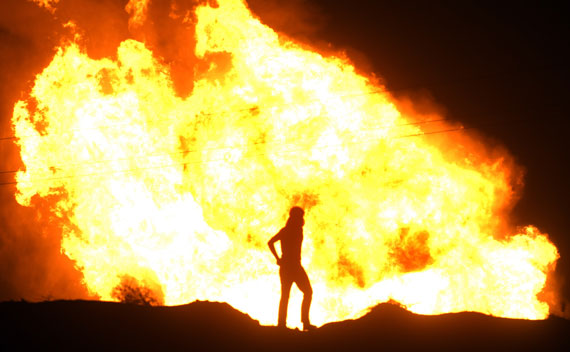The Eagle Has Landed…In Sinai?
More on:

Let’s review what’s happening in the Middle East: Syrian forces are attacking peaceful protesters throughout the country; Iraq is cleaning up from one of the worst days of violence in recent memory; Libyan rebels are knocking on Tripoli’s door; former Egyptian President Hosni Mubarak’s trial for murder and corruption was adjourned until September 5; Egypt’s Supreme Council of the Armed Forces is turning up the heat on revolutionary activists with the arrest of Asmaa Mahfouz; and in what has been dubbed “Operation Eagle,” Egypt deployed approximately 2,500 troops and somewhere in the neighborhood of 250 armored vehicles, including tanks, to al Arish, Sheikh Zuwayd, and Rafah deep into the Sinai. Just another week... Wait, the Egyptians did what? They sent thousands of troops into the Sinai? That’s not supposed to happen, right? The Camp David Accords and the Egypt-Israel peace treaty limit Egyptian military forces to an area about 30 miles east of the Suez Canal. This is a huge story and besides a brief article in the Washington Post, a report on CNN.com, and an article in Time (yes, Time) the media has largely ignored the deployment. Sadly, deep fried butter on a stick at the Iowa State Fair has received way more coverage over this weekend than a military move that has the potential to alter longstanding agreements between Egypt and Israel.
Here is what is happening: Since Mubarak’s departure for Sharm el Sheikh on February 11th and the collapse of the Ministry of Interior, the Sinai has grown increasingly chaotic. In the last six months, Egypt’s pipeline infrastructure in the region has been attacked four times, there was a brazen assault on the port of Nuweiba, a call for the establishment of the Islamic Emirate of Sinai, and the implementation of shari’a. The Sinai has long been a hotbed of smuggling—weapons, drugs, and people—a hideout for extremists (reportedly including elements loyal to al Qaeda); and anger on the part of Bedouin groups over the way they are treated at the hands of the police and intelligence service. Beyond these immediate problems, the Sinai is the least developed part of the country and as a result, has the highest unemployment rate among all of Egypt’s 29 governorates. Many of the Bedouin in the Sinai have no particular allegiance to Egypt.
It was the July 30 attack on an al Arish police station, an attempted assault on one of the Eastern Mediterranean Gas Company’s—the consortium that buys gas from Egypt and sells it to Israel—facilities near al Arish, and the distribution of leaflets there calling for the implementation of Islamic law in North Sinai that seem to have gotten the SCAF’s attention. The military, worried about security in the Sinai and wanting to demonstrate (to the United States, primarily) that the armed forces have both a firm grip on the country and that Egyptian military remains a force for regional stability, apparently sought out the Israelis to coordinate the deployment.
The Israelis find themselves with a dilemma on their hands. From their perspective the Sinai has been a festering security problem for over a decade. They have looked on with amazement as the Egyptians have done very little to address the social ills of the region, warned Cairo that there was al Qaeda presence in the area (something the Egyptians denied until 2005), and have grown concerned as the border restrictions between Gaza and Egypt have recently been eased. Yet what choice did they really have? They agreed to the deployment of two battalions from Egypt’s 2nd Army because the alternative, the Sinai spinning completely out of control, is worse and the Israeli security establishment wants to demonstrate goodwill toward the SCAF with whom it hopes to build a new relationship. The Israelis are nevertheless nervous about the effectiveness of the Egyptian forces and whether the deployment will begin the process of altering the restrictions on Egyptian military activity in the Sinai. There is no time limit on the Egypt’s military operations. For now, it is subject to review—whatever that means. The Egyptians insist that they will leave when their operations are complete. Yet, if the security situation in the Sinai is as bad as some suggest, it may well be some time before Egyptian forces leave. Even after Operation Eagle is brought to an end one could imagine Cairo making the argument that the military needs to stay in the Sinai to ensure security.
A more secure Sinai is a good thing for everyone, but any effort well beyond their 30-mile limit (the is no evidence so far that this is the SCAF’s intention) has a clear political benefit for the officers because so many Egyptians want to revisit the Camp David Accords and the peace treaty. For now, the Israelis apparently believe being flexible about past agreements is worth the risk. At the moment countenancing Egyptian forces in the Sinai is certainly better than a further deterioration of the Sinai’s security and someone taking a shot at Eilat from there. Of course, there is always the possibility that Egypt’s operations will, in unintended ways, contribute to the Sinai’s problems. The twitter feed suggestion that the Sinai will become “Egypt’s Waziristan” is no doubt exaggerated, but it is yet another significant challenge in the extraordinarily complex problem of building the new Egypt. The struggle for Egypt continues...
More on:
 Online Store
Online Store